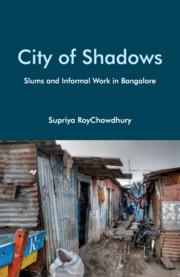Book contents
- Frontmatter
- Contents
- List of Tables
- Acknowledgements
- 1 Introduction
- 2 Welfare and Work: State Autonomy Revisited
- 3 Urban Poverty and Informal Work
- 4 A Political Economy Overview: Karnataka and Bangalore
- 5 New Slums: Migration, Livelihoods and Living
- 6 Old Slums
- 7 Impact of Slum Housing Policies: Bangalore’s New Ghettoes
- 8 Women Workers in Bangalore’s Garment Export Companies
- 9 Conclusion
- Index
8 - Women Workers in Bangalore’s Garment Export Companies
Published online by Cambridge University Press: 31 July 2021
- Frontmatter
- Contents
- List of Tables
- Acknowledgements
- 1 Introduction
- 2 Welfare and Work: State Autonomy Revisited
- 3 Urban Poverty and Informal Work
- 4 A Political Economy Overview: Karnataka and Bangalore
- 5 New Slums: Migration, Livelihoods and Living
- 6 Old Slums
- 7 Impact of Slum Housing Policies: Bangalore’s New Ghettoes
- 8 Women Workers in Bangalore’s Garment Export Companies
- 9 Conclusion
- Index
Summary
The debate on employment has been outlined in Chapter 3, and I briefly highlight here that while the increasing share of services in GDP has made this sector central to the current phase of growth, there remain concerns that the share of services in creating employment has been relatively lacklustre. In this context, the drying up of manufacturing sector employment has drawn much attention. As manufacturing industries turn increasingly towards globally competitive, capital-intensive, and high-technology production, the question that has been asked is whether this trajectory is appropriate in a country where the majority of the workforce is still unskilled and therefore unemployable in technology-embodying domains, whether in manufacturing or in services.
In this context, the emergence of apparel exports as a labour-intensive, growing industry rings a very optimistic tone. Apparel production was an exclusive domain of the industrially developed countries until the 1970s or 1980s, when the relocation of the industry to less-developed countries and China began primarily in search of cheaper labour costs in a predominantly labour-intensive industry. The significant contribution of the ready-made garment (RMG) sector in terms of development of exports as well as generation of employment notwithstanding, the use of a largely female workforce in highly irregular and insecure wage and working conditions has cast a long shadow on the RMG sector. A critical discourse emerging from researchers, NGOs and trade unions has increasingly framed this industry, forcing, to some extent, the attention of international brands on the unfair conditions in factories across the Global South which produce for global apparel retail. However, ground-level conditions, in terms of wages and working conditions, remain poor and particularly so in the absence of collective bargaining mechanisms, aided by the indifference of governments and political parties (Mezzadiri 2016).
My earlier work on garment workers in Bangalore provided ethnographic accounts of the lives of women workers, touching on socio-economic backgrounds, worker households, aspirations and mobility (RoyChowdhury 2010, 2015). This chapter draws upon recent field research, conducted in 2016 and in 2018. Garment factories in Bangalore are spread across the city, with some concentration in older industrial areas like Peenya and Yeshwantpur in north Bangalore and Mysore Road in the west of the city.
- Type
- Chapter
- Information
- City of ShadowsSlums and Informal Work in Bangalore, pp. 176 - 200Publisher: Cambridge University PressPrint publication year: 2021



